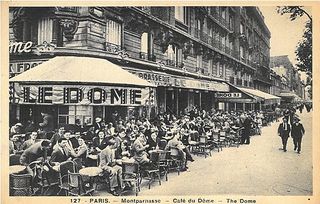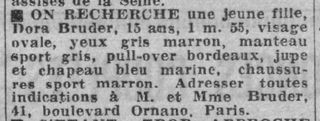Trauma
Intergenerational Trauma: Patrick Modiano
Patrick Modiano's Dora Bruder looks at traumatic events associated with WWII.
Posted August 9, 2019
That trauma can be transmitted intergenerationally is generally accepted by mental health professionals. Psychologist Tamaré Hill offers us succinct definition: “I tend to define inter-generational trauma as a traumatic event that began years prior to the current generation and has impacted the ways in which individuals within a family understand, cope with, and heal from trauma.”
Negative parenting behavior contributes to the transmission of trauma. When parents suffer from unresolved trauma, their parenting can be negatively affected by depression, substance abuse, mental illness, and other conditions. They might be less attuned as parents and demonstrate responses to experience that model negative modes of coping. They might even perpetuate harmful aspects of their own trauma; sexual abuse is often perpetuated through the generations.
Recent research further suggests that effects of trauma might have a detrimental effect in utero and that it might also negatively impact DNA. Historical trauma, the legacy of trauma that affects a specific group of people who have been oppressed or endured collective trauma, can also be passed down through the generations.
Whatever the source, unresolved trauma can have a detrimental effect on descendants. PTSD and other symptoms of trauma are widespread within the African American community, although it is difficult to parse the effects of historical trauma from ongoing racism. The children of Holocaust survivors were found to have sensitized reactions to stress that rendered them less resilient in comparison with their peers. Historians have found that the sons of Civil War Union Army soldiers were more likely to die young than the sons of soldiers who had not been imprisoned. At the very least, parents can convey their own unresolved feelings and attitudes towards their traumatic past to their children.
We can speculate that the great French writer Patrick Modiano, recipient of the Nobel Prize in Literature in 2014, was preoccupied with World War II as a result of the intergenerational transmission of trauma. This might well have been overdetermined: Modiano’s father was Jewish, but his trauma might have its roots in the wartime trauma of the German occupation of France. Modiano was born in 1945, right after WWII had ended. But his novels revolve around events during WWII and the consequences of those experiences for people who lived through the war years.

Modiano’s magnificent novel Dora Bruder is a work of discursive archaeology, a detective saga, a historical rescue mission, a testament to the inhumane and unthinkable destruction perpetrated by the Shoah, and a refusal to let one young woman, Dora Bruder, a young French Jew sent to Auschwitz, be buried beneath the weight of history. As Modiano’s narrator searches through scant records to reconstruct Dora’s story, he explores Paris throughout the sixty years since her deportation, so that his reconstruction of the city parallels his reconstruction of Dora’s life. Paris is different, but there are records of the older city, including documents, photos, and memories, just as there are traces of Dora’s life. This linkage renders Dora emblematic of a particular and terrible historical moment.
At one point, Modiano’s narrator claims that some novelists have clairvoyance or vision, that he feels a strange connection with those who died just as he was born. He identifies with both Dora and other brutally murdered characters as well; living in occupied France doesn’t preclude adolescent angst, which Modiano similarly experiences twenty years after Dora’s death. Modiano becomes the medium through which Dora’s life and existence can be known, a defiance of the Nazi genocide that would have erased Dora’s existence as well as taking her life. Modiano writes what he knows, but his insights apply to the racism and genocide being perpetrated in so many places. “Never Forget” not only specific horrors but the cruelty and destruction of which humans are capable.

It has been found that writing about traumatic events is an effective way to heal trauma for many people. To date, we can only guess at the mechanisms involved in such healing. People who write about their trauma tend to feel worse initially, which might stimulate the release of cortisol; this is beneficial in the short run. Even more important, writing integrates different parts of the brain, emotional and cognitive, thereby countering the dissociation that characterizes trauma. Studies on writing and trauma reveal that people who write about their traumatic experiences for a sustained length of time (such as several days) report fewer illnesses and less depression.
Perhaps Modiano self-heals through his many wonderful novels. He has said that he writes the same novel over and over, which might well be a sign of his need to resolve a persistent trauma. In addition, his novels offer his French readers a way of confronting and resolving the historical trauma of wartime occupation. Whatever their source or their therapeutic effects, Modiano’s novels immortalize a moment in history through extraordinary writing that involves the minds and hearts of his readers.
References
Hammond, Claudia (June 2, 2017). The puzzling way that writing heals the body. Retrieved from http://www.bbc.com/future/story/20170601-can-writing-about-pain-make-yo…
Hill, Támara (December 18, 2017). Should mental health professionals understand intergenerational trauma? Retrieved from https://www.acamh.org/blog/intergenerational-trauma/.
Love, David (June 5, 2016). Post-Traumatic Slave Syndrome and Intergenerational Trauma: Slavery is Like a Curse Passing Through the DNA of Black People. Retrieved from https://atlantablackstar.com/2016/06/05/post-traumatic-slave-syndrome-a….
Markman, Art (Oct. 20, 2009). Trauma and the Benefits of Writing About It. Retreived from https://www.psychologytoday.com/us/blog/ulterior-motives/200910/trauma-….
McCall, Catherine (March 3, 2011). Writing and Healing: Exploring the Power of the Written Word in Mental and Physical Well-being. https://www.psychologytoday.com/us/blog/overcoming-child-abuse/201103/w…
Rodriguez, Toni (March 1, 2015). Descendents of Holocaust Survivors Have Altered Stress Hormones. Retrieved from https://www.scientificamerican.com/article/descendants-of-holocaust-sur…


